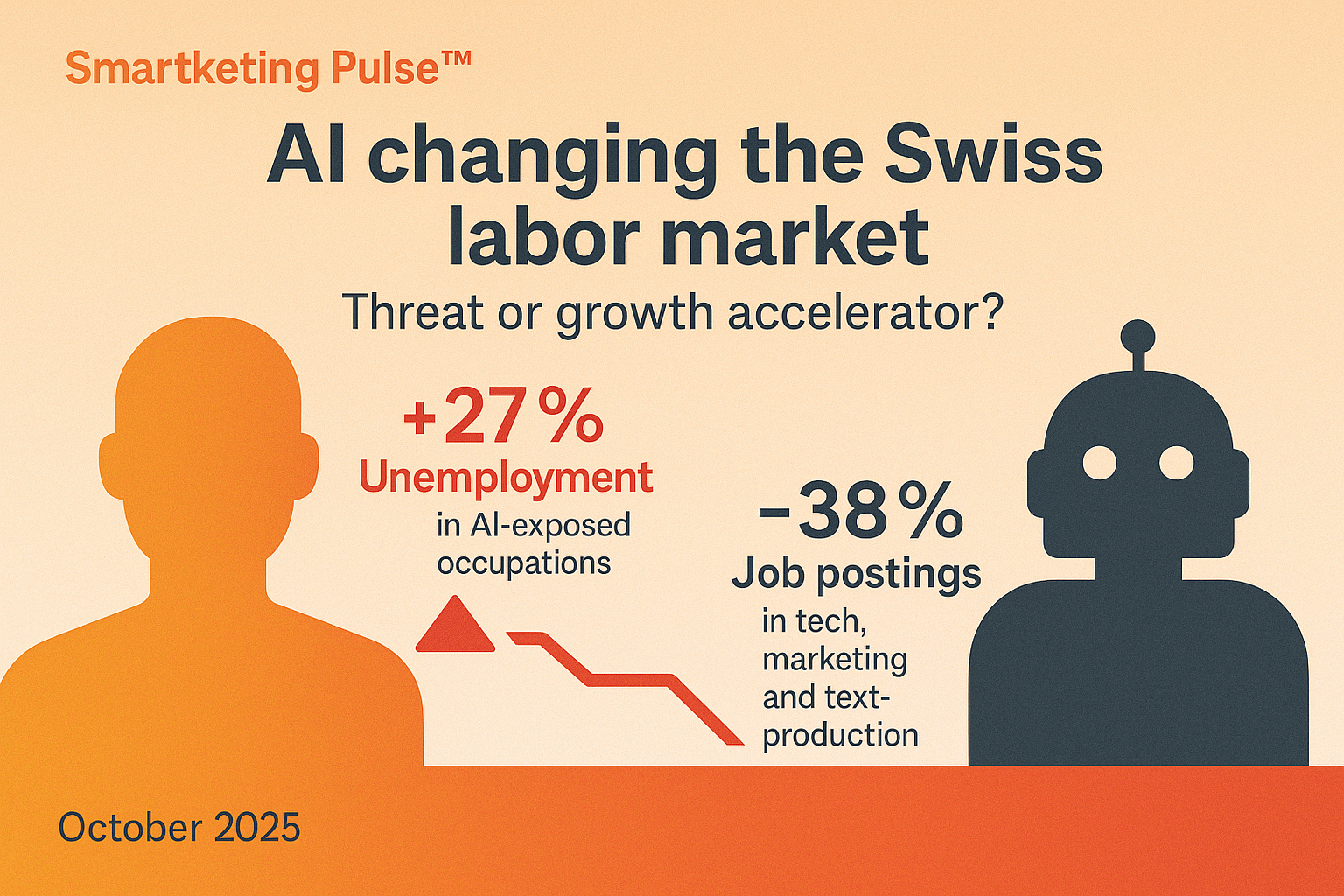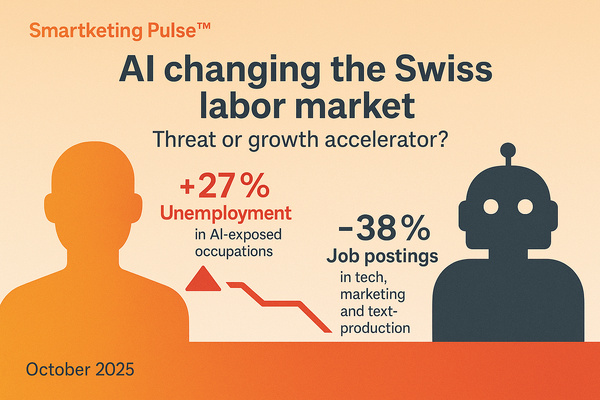🧠 A Silent but Profound Mutation
Swiss marketing is undergoing a quiet revolution.
On the surface, everything looks normal: brands communicate, agencies create, businesses promote.
But beneath that calm exterior, something fundamental is shifting — generative artificial intelligence is redrawing the boundaries of marketing work.
A study published in October 2025 by the KOF Institute at ETH Zurich provides the first statistical evidence of this transformation.
Since the launch of ChatGPT and other large language models in late 2022, occupations highly exposed to AI have seen their labor market indicators decline sharply:
-
+27% increase in the number of job seekers,
-
−38% drop in job postings in marketing, communications, writing, and tech.
In short, marketing is no longer simply influenced by AI — it’s being reshaped by it.
📉 A Profession Exposed at Its Cognitive Core
Unlike previous waves of automation that targeted manual or routine labor, AI now focuses on cognitive work — and marketing sits right at the center of that shift.
Copywriters, strategists, SEO specialists, social media managers, journalists — all perform tasks that involve research, synthesis, language, and creativity.
These are exactly the kinds of tasks that generative models can automate or accelerate.
The result is not only fewer jobs, but a redefinition of the job itself.
The Swiss marketer is becoming a technological conductor — managing algorithms, data, and prompts as much as ideas and strategy.
⚙️ Agencies and SMEs Under Pressure
Swiss companies, especially SMEs, now face a unique challenge:
how to integrate AI tools that promise spectacular productivity gains without losing coherence, tone, and trust.
Some agencies have integrated AI internally; others have replaced positions with automation.
But this substitution reflex quickly reaches its limits — it may cut costs, but it also flattens creativity.
We are entering an age of content inflation and meaning scarcity.
Never before has it been so easy to generate marketing material — and never has it seemed so uniform.
In a country where communication relies on precision, authenticity, and multilingual nuance, this homogenization of voice risks undermining the very essence of Swiss marketing.
🧩 A Polarized Job Market
The KOF study highlights a growing polarization of the labor market:
on one side, highly skilled professionals who can manage AI systems, interpret data, and design integrated campaigns;
on the other, task-oriented roles that are rapidly losing value.
Younger professionals are the most affected — the study shows that under-50s represent the largest share of the increase in unemployment.
They enter a job market that now demands hybrid profiles: creative thinkers with technical fluency.
This signals the start of a requalification era in marketing education, where creative and analytical skills must merge.
🧭 The Challenges of Post-Human Marketing
AI offers Swiss marketing an unprecedented paradox:
efficiency without empathy, scalability without soul.
Automation can deliver impressive short-term results — instant content generation, data-driven targeting, real-time personalization.
But it also risks eroding the human tone and emotional intelligence that make communication credible and persuasive.
In a multicultural, multilingual country like Switzerland, trust remains the foundation of marketing.
And trust, by its very nature, cannot be delegated to a machine.
🌍 A Chance for Reinvention
Still, this transformation should not be seen only as a threat.
History shows that marketing evolves with every technological leap — and Switzerland has strong assets: rigor, precision, and a culture of reliability.
The challenge now is to integrate AI intelligently, not blindly — to build hybrid models where humans and machines collaborate instead of compete.
The future of Swiss marketing will belong to those who can combine analytical power with creative authenticity, who understand that technology is a tool, not a replacement for meaning.
✒️ In Conclusion
Artificial intelligence is transforming Swiss marketing faster than any previous innovation.
But its true impact will depend less on the technology itself than on how professionals choose to adapt.
Swiss marketing — known for its subtlety and precision — now faces a defining moment:
to stay human in an increasingly automated world.
The future is not about choosing between humans and AI, but about teaching them to think together.
Sources:
KOF ETH Zurich – “KI und der Schweizer Arbeitsmarkt”, Study No. 186, October 2025
Analysis and adaptation by Mathieu Janin
 Accueil
Accueil






 Accueil
Accueil
























